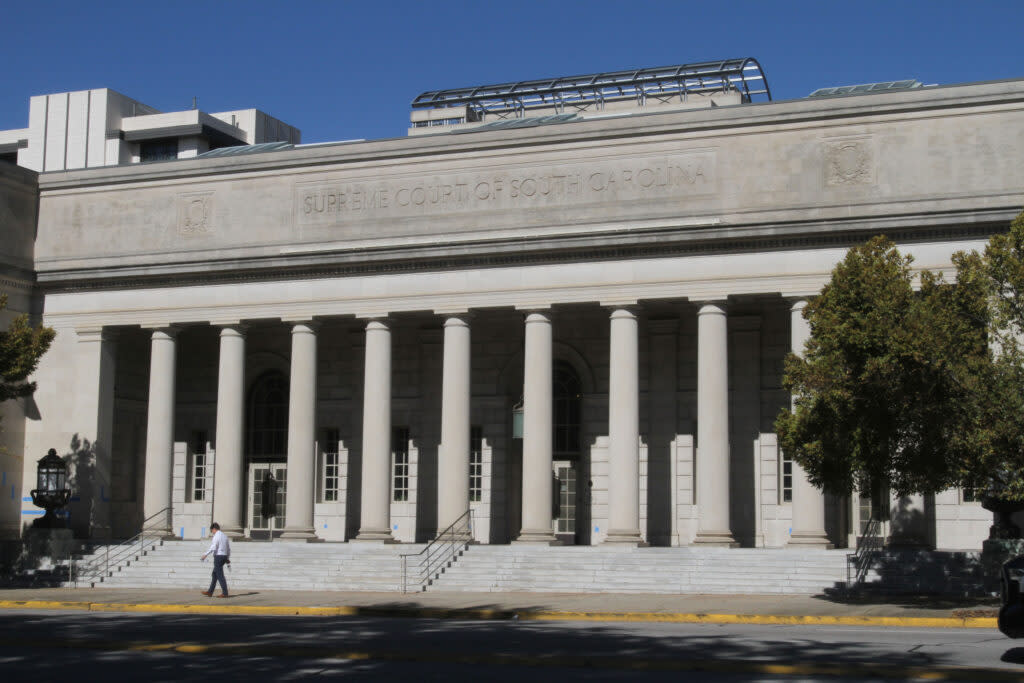Voter groups file suit arguing GOP gerrymandering in SC’s 1st District is unconstitutional

- Oops!Something went wrong.Please try again later.
The South Carolina Supreme Court in Columbia. (Mary Ann Chastain / Special to the SC Daily Gazette)
COLUMBIA — A voter advocacy group is asking the state Supreme Court to rule on whether South Carolina’s redrawn congressional maps violate the state constitution.
The U.S. Supreme Court in May issued a 6-3 ruling tossing out an earlier case brought by South Carolina chapters of the NAACP and the American Civil Liberties Union on behalf of Taiwan Scott, a Black Hilton Head Island resident who lives in the 1st District. That case argued state legislators drew the coastal 1st District, held by Republican Nancy Mace, in a way that discriminates against Black voters.
The GOP-controlled Legislature pushed back, testifying it was politics — not race — that influenced how the lines were redrawn following the 2020 Census. The nation’s high court sided with legislators, reversing a lower court ruling.
Now, the South Carolina League of Women Voters and the American Civil Liberties Union hope to use legislative leaders’ admitted partisanship against them in state court where voting protections are broader.
In a petition filed Monday asking the state Supreme Court to take up the question directly, the groups argued the redrawn map signed into law in January 2022 violates the state constitution’s guarantees of “free and open” elections and an “equal right to elect officers.” The lawsuit also argues the redrawn district lines violate voters’ rights to equal protection under law, their rights to be free from viewpoint discrimination and the South Carolina Constitution’s commitment to respecting county boundaries during redistricting.
It’s about not only equal access to the ballot box but ensuring that all ballots cast hold equal weight, said Lynn Teague of the League of Women Voters.
“That doesn’t happen when you have gerrymandering,” she said. “You need to have meaningful representation of the population that’s there.”
House Speaker Murrell Smith called the latest lawsuit “as baseless as other challenges to these lines have been.
“This new lawsuit is another attempt by special interests to accomplish through the courts what they cannot achieve at the ballot box — disregarding representative government,” said the Sumter Republican. He and Senate President Thomas Alexander, R-Walhalla, are the two legislative leaders directly named in the lawsuit.
South Carolina’s 1st District has long been reliable for Republicans. However, a population explosion on the coast turned it more purple. In 2018, Democrat Joe Cunningham flipped the seat to blue for the first time in nearly 40 years.
Two years later, Mace ousted him by 1 percentage point, flipping the seat back to Republican control. After the post-census redrawing of lines, Mace easily won in 2022 against Democrat Annie Andrews.
Teague said gerrymandering also impacts how people think about elections. She said the League too often hears residents ask why they should bother voting and referring to the system as “rigged.”
“People should not feel like that,” Teague said.
The ACLU of South Carolina called the redrawn maps an “intentional distortion of democracy.”
“Partisan gerrymandering is cheating, plain and simple,” said the organization’s legal director, Allen Chaney. “South Carolina voters deserve to vote with their neighbors, and to have their votes carry the same weight. This case is about restoring representative democracy in South Carolina.”
In the racial gerrymandering case, a panel of three federal judges pointed to 30,000 Black Charleston County residents who lawmakers moved into the 6th District — represented by Jim Clyburn, South Carolina’s only Democrat in Congress — in an effort to make the seat a safer bet for Republicans. The new lines swept in Republican strongholds in Beaufort and Berkeley counties while cutting out some Charleston suburbs and the entire downtown peninsula.
The ACLU, in its statement Monday, highlighted testimony from that case: “[M]y primary goal was to draw a Republican district while honoring redistricting principles as best as I could,” said Sen. Chip Campsen, R-Isle of Palms.
And after the Supreme Court’s ruling, Senate Majority Leader Shane Massey told reporters the district was still politically competitive even after lines were moved for political reasons.
“I said it would have been political malpractice for us to sacrifice the 1st (District),” the Edgefield Republican said in May. “We were not going to pass a plan that sacrificed the First, but that was all about political calculations. And that was the case because those were the rules the Supreme Court set out.”
Theresa Lee, senior staff attorney with the ACLU’s Voting Rights Project, said that’s admission “that their congressional plan stacks the deck.
“This is not how democracy works,” she said.
The ACLU also pointed to court rulings in other states with similar constitutional language — including Kentucky, Pennsylvania, and New Mexico — that said partisan gerrymandering violates voters’ rights.
Teague, whose organization has advocated for equitable and representative redistricting, recognizes that the lawsuit is unlikely to influence the November 2024 elections. But she hopes the state’s highest court will take up the matter and set standards for future redistricting.

